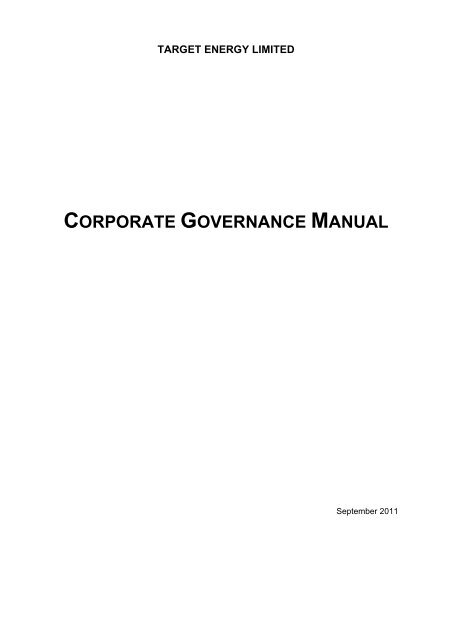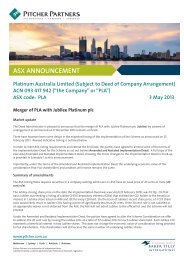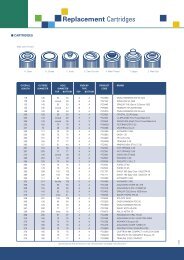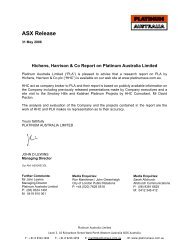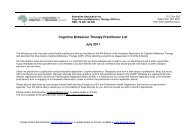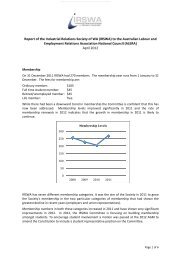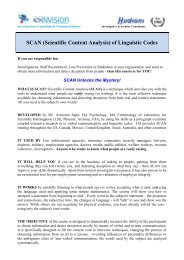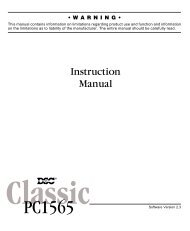CORPORATE GOVERNANCE MANUAL
CORPORATE GOVERNANCE MANUAL
CORPORATE GOVERNANCE MANUAL
Create successful ePaper yourself
Turn your PDF publications into a flip-book with our unique Google optimized e-Paper software.
TARGET ENERGY LIMITED<br />
<strong>CORPORATE</strong> <strong>GOVERNANCE</strong> <strong>MANUAL</strong><br />
September 2011
Corporate Governance Manual<br />
The Board of Directors accepts the responsibility for the overall corporate governance of<br />
Target Energy Limited (TEX).<br />
The Board will ensure the interests of TEX's shareholders are primary and also take into<br />
account the interests of its employees, customers, suppliers, lenders and the wider<br />
community.<br />
The Board is responsible for setting the strategic directions for TEX, establishing and<br />
reviewing policies and goals for management and monitoring the achievement of these goals<br />
and policies. The Managing Director is responsible to the Board for the day-to-day<br />
management of the Company and reporting progress and issues to the Board.<br />
The Board's responsibilities and duties include the following:<br />
• Appointing the Managing Director;<br />
• Determining the strategic direction of TEX as an outcome of executive management<br />
recommendations and measuring performance against approved strategies;<br />
• Adopting operating budgets at the commencement of each financial year and monitoring<br />
progress on a regular basis against budget by both financial and non-financial key<br />
performance indicators;<br />
• Monitoring and overseeing TEX's financial position and risk management priorities;<br />
• Evaluating the performance of the Managing Director and determining remuneration;<br />
• Determining that satisfactory arrangements are in place for auditing TEX's financial<br />
affairs; and<br />
• Ensuring that policies and compliance systems consistent with TEX's objectives and<br />
industry best practice are in place and providing the necessary framework for TEX and<br />
its officers to act legally, ethically and responsibly on all matters.<br />
• Ensuring a reasonable view of all stakeholders is taken into account.<br />
Under the Constitution, the minimum number of directors is three (3). TEX currently has four<br />
(4) directors, including one (1) executive director and three (3) non-executive directors. The<br />
Constitution also requires that at each annual general meeting, one third of the directors<br />
must resign with those directors who have served the longest being subject to rotation first<br />
(note: there is a rotation exemption for the Managing Director). Additionally, pursuant to the<br />
Constitution, any new director appointed by the Board within a year must retire at the next<br />
AGM to be then offered for re-election under an ordinary resolution.<br />
Meetings<br />
The Directors generally hold Board meetings not less frequently than once every two<br />
months.
Corporate Governance Manual<br />
Board Committees<br />
The Company does not have an Audit, Remuneration or Nomination Committee of the Board<br />
of Directors. The full Board of Directors undertake the role of these individual committees.<br />
Given the composition of the Board and the size of the Company, it is felt that individual<br />
committees are not yet warranted, however it is expected that as the Company’s operations<br />
expand that each of these committees will be established.<br />
Board Composition<br />
The Company has recognised the importance of having a balanced Board comprised of<br />
directors with an appropriate range of backgrounds, skills and experience.<br />
New directors are sought to complement the skills and background of the existing Board.<br />
New directors provide a fresh look at the operations, strategies and direction of the company<br />
and are sought based upon a reputation for integrity<br />
Independent Professional Advice<br />
After prior approval of the Chairman, directors may obtain independent professional advice at<br />
the expense of the Company on matters arising in the course of their Board duties.<br />
Ethics<br />
It is the policy of TEX that all Directors, managers and employees are expected to act with<br />
the utmost integrity and objectivity, striving at all times to enhance the reputation and<br />
performance of TEX.<br />
Other Directorships<br />
Directors are required continually to evaluate the number of Boards on which they serve to<br />
ensure that each can be given the time and attention required properly to satisfy duties and<br />
responsibilities. Directors are required to notify the Chairman in writing prior to accepting an<br />
invitation to become a Director of any corporation, listed or otherwise. Executive directors<br />
may not accept appointment to the Board of any corporation outside TEX without prior<br />
approval of the board.<br />
Risk Management<br />
The Company has in place a framework to safeguard Company assets and ensure that<br />
business risks are identified and properly managed.<br />
It is part of the board’s oversight role to oversee the establishment and implementation of the<br />
risk management system, and to review the effectiveness of the company’s implementation<br />
of that system. Due to the size of the company it does not have an internal audit function or<br />
a Risk sub-committee of the Board.
Corporate Governance Manual<br />
The following is a listing of the material business risks facing the company:<br />
‣ compliance<br />
‣ environmental<br />
‣ occupational health and safety<br />
‣ exploration and discovery<br />
‣ insurance<br />
‣ operator and contractor<br />
‣ foreign exchange<br />
‣ financial commitments<br />
‣ reputation<br />
‣ opportunity identification<br />
‣ capital markets<br />
‣ operations/production<br />
‣ land access<br />
‣ reliance on key personnel<br />
‣ fraud<br />
‣ reporting<br />
‣ ability to access finance<br />
Management is responsible for the identification, assessment, monitoring and management<br />
of material risk throughout the company. Management report to the Board annually to<br />
confirm how each of the company’s material business risks are being managed. The Board<br />
monitor the management of risks on an ongoing basis.<br />
The Company has in place a number of risk management controls which include the<br />
following:<br />
• Guidelines and limits for the approval of capital expenditure and investments; and<br />
• A comprehensive insurance programme including external risk management surveys.<br />
• A delegation framework for the Managing Director and senior management.<br />
• Authorisation procedures for the payment of operating costs.<br />
• Annual audit of the company’s Financial Statements and a review of the half year<br />
Financial Statements.<br />
Role of Shareholders<br />
The shareholders of the Company play an important role in corporate governance by virtue<br />
of their responsibilities for voting on the appointment of directors.<br />
The Board ensures that shareholders are kept fully informed on developments affecting the<br />
Company through:<br />
• The Annual Report distributed to shareholders;<br />
• Compliance with Australian Stock Exchange's continuous disclosure requirements (and<br />
subsequent shareholder announcements); and<br />
The annual general meeting and other meetings called to obtain approval for Board action.<br />
Process for Evaluating the Performance of Executives<br />
Each year the Chairman and the executive meet informally to discuss the chairman’s<br />
evaluation of the executive’s performance.<br />
Process for Evaluating the Performance of Directors<br />
Each year the Chairman meets informally with each director to discuss the Chairman’s<br />
evaluation of the director’s performance.<br />
The Constitution requires that 1/3 of directors retire from office at each annual general<br />
meeting. No director, with the exception of the Managing Director, may hold office for longer
Corporate Governance Manual<br />
than three years without submitting himself for re-election. Retiring directors are eligible for<br />
re-election. The Managing Director is not subject to rotation.<br />
Selection and Appointment Policies for External Auditors<br />
Mann Judd have been the Company’s auditors since incorporation. They were selected on<br />
the basis of being reputable and appropriate in terms of size, resources, location and price<br />
for a listed oil and gas explorer.<br />
External Auditors Partner Rotation Policy<br />
The external auditor has a rotation policy such that the engagement lead partner is rotated in<br />
accordance with the requirements of the Corporations Act, such that the lead partner signs<br />
off on five consecutive 30 June audit reports and five consecutive 31 December half-year<br />
review reports and then rotates to another audit partner. Once a lead partner is rotated off,<br />
he/she cannot have any involvement with that client for a period of 2 consecutive years.<br />
Auditor Independence<br />
Target recognises and supports the fundamental principle of maintaining auditor<br />
independence. Target has a policy controlling the provision of non-audit services by the<br />
auditors. Auditors are not prohibited from supplying non-audit services provided those<br />
services are subject to independent approval from the Board.<br />
Unvested Entitlements<br />
There are no unvested entitlements under any equity-based remuneration schemes.<br />
Diversity Policy<br />
Target adopted a Diversity Policy in July 2011.


